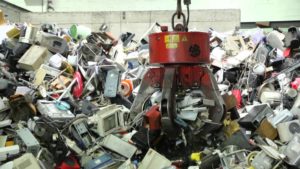“E-waste is a rapidly growing waste stream in the country. From 3.9 kilos per capita in 2019, 537 million kilograms of e-waste were produced in the Philippines, translating to 4.7 kilograms of e-waste per capita in 2022,” said Jam Lorenzo, research and policy development officer of BAN Toxics, an environmental justice NGO.

The recently published Global e-Waste Monitor 2024 by the United Nations reveals the Philippines as one of the top e-waste producers in Southeast Asia.
“That e-waste is escalating at a pace five times faster than the rate of e-waste recycling further sends a chilling effect,” Lorenzo remarked.
Waste Electrical and Electronic Equipment (WEEE), commonly referred to as e-waste, refers to end-of-life electrical and electronic equipment and covers everything with a plug or a battery. E-waste is categorised as hazardous waste due to the presence of toxic materials such as mercury, lead, and brominated flame retardants that are considered as hazardous waste according to the Basel Convention.
The primary types of e-waste in the Philippines are consumer electronics such as televisions, refrigerators, washing machines and mobile phones. Technological advancements leading to the production of new technologies, along with trends in consumer products, shorter product life cycles, and limited repair options, have accelerated the rate at which electronics are replaced and discarded.
“We cannot afford to perpetuate this cycle of consumption, waste generation, and recycling model in its current form,” Lorenzo emphasised.
The e-waste Monitor also underscores the growing quantities of electrical and electronic goods (EEE) being sold in developing countries, as well as equipment originally used in developed countries and exported for further use in developing countries. “The escalating volume and toxicity of e-waste make this issue urgent, as it can lead to significant environmental and health problems.”
“Once discarded, these gadgets often end up in waste bins, are sold in junk shops, dismantled by informal waste collectors, and ultimately find their way to dumpsites and landfills. The lack of proper e-waste disposal facilities and infrastructure poses a significant challenge, largely stemming from the absence of a national management framework for e-waste. This lack of a definitive national framework makes it difficult to implement effective policies. While overarching environmental laws may address e-waste, our regulations often lack enforceability,” Lorenzo remarked.
The group emphasised the critical need for legislation and programs mandating Extended Producer Responsibility (EPR) for electronics, holding manufacturers accountable for their products at end-of-life. “EPR schemes will facilitate environmentally sound management, shifting the burden of end-of-life management from taxpayers to producers, consistent with the polluter pays principle and cost internalisation.”
“Manufacturers will be incentivised to incorporate eco-friendly design and manufacturing practices, employing materials that are easily recyclable and less toxic, while also extending the lifespan of electronic products.”
The environmental justice group advocates for “a genuine sustainable production and consumption of electronic and electrical goods, aiming to reduce waste, retain value within the system, extend the economic and physical life of a product, and enhance its potential for repair, recycling, and reuse.”
“The key to a successful transition is inclusivity, which takes into account the millions of people in developing countries who did not produce the waste but often suffer the negative impacts resulting from the historical injustices of pollution and waste generated by wealthier producer countries. Additionally, it requires anticipating the adverse future impacts on workers, sectors and communities that would be affected by transitions.”
BAN Toxics also advocates for stronger regulatory measures concerning e-waste in the country, including recognising the growing importance of plastics utilised in electronic and electrical equipment.
“Given that e-waste recycling involves plastics recovery, we will persist in our efforts to promote a legally binding global plastics treaty during the upcoming interagency negotiations in April this year in Ottawa, to mitigate the increasing exposure to plastics and e-waste,” Lorenzo concluded.
